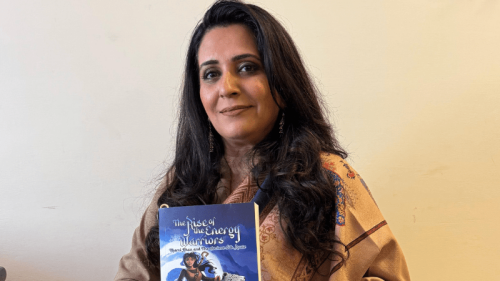
The Lost Fragrance of Infinity
By Moin Mir
Liberty, Karachi
ISBN: 978-9698729875
318pp.
After his debut book — the semi-fictional historical chronicle Surat: Fall of a Port, Rise of a Prince - Defeat of the East India Company in the House of Commons — Moin Mir has come out with his first proper novel.
The Lost Fragrance of Infinity, subtitled A Novel Glowing with the Essence of Sufism, is a beautifully written story with multiple tiers. The narrative meanders like a mountain stream and is split into two parallel journeys; one relates a physical sojourn across continents, the other is an enthralling exploration of spirituality.
The story begins in 1738 in Delhi. Protagonist Qaraar Ali hails from a family of craftspersons — his ancestors had been chief artisans to the supreme architects of the Mughal court — and his talented skill in construction and tilework earns him recognition and laurels from Muhammad Shah, the 13th Mughal emperor and a great patron of arts and culture.
Qaraar Ali falls in love with Abeerah, the only daughter of a Mughal general. Their passionate affair soon becomes the talk of Delhi town and, after a few hiccups, their families agree to their marriage. In the meantime, Qaraar meets a Sufi who teaches him the art of making tiles with geometric designs. This new skill takes Qaraar to greater heights and he earns quite the reputation, as well as wealth, from court-sponsored projects.
A well-paying career, rising status in society and impending marriage to the love of his life — Qaraar Ali has it all. He and Abeerah are looking forward to a joyous future, and that is when calamity strikes. However, while the calamity appears sudden, the seeds for it were sown much earlier.
A beautifully written novel set in the 18th century that encompasses two journeys, one about a physical sojourn across continents, and the other an enthralling exploration of Sufism and spirituality
The latter half of the 17th century was a time of great upheaval in the world. In 1659, Mughal crown prince Dara Shikoh was executed by his younger brother, Aurangzeb, who took over the throne. In 1666, Shah Abbas II of Persia died from multiple debilitating illnesses brought on by his excessive debauchery and consumption of alcohol. In 1683, the Ottoman empire suffered a notable defeat in Austria, heralding its gradual, yet steady, decline.
Mir writes: “These three events set into motion the irreversible process of the collapse of three empires inextricably entwined with the diminishing influence of the Sufis. By the 1730s, intellectuals from Istanbul to Delhi were filled with an ominous feeling of impending anarchy.”
With only a short while left before Qaraar and Abeerah’s wedding, Iran’s ruler Nader Shah invades Delhi. His military unleashes a bloodbath, conquers the city and then burns it down. Among the casualties are the bridal couple’s families. In the chaos, Qaraar kills the commander of Nader Shah’s forces. He manages to escape with Abeerah but, as the fearsome melee gets out of hand, she is separated from him and disappears.
With a prize for his capture and Nader Shah’s soldiers in hot pursuit, Qaraar is smuggled out of the Subcontinent by two fugitive Uzbeks. They later sell him at an auction in Merv (in present-day Turkmenistan) to the Viking slave trader Aalf Olsson.
This marks the beginning of the great physical and spiritual odyssey Qaraar is destined to undertake. The enslaved tilemaker is whipped and made to perform menial tasks — cleaning his master’s boots, washing clothes and collecting firewood. Olsson then discovers that his slave is, in fact, a learned artisan. He asks Qaraar to teach him how to read and write Urdu and Persian and, after some time, sets Qaraar free.
In the introduction, Mir states: “For years, I strived to find a way of demonstrating the importance of Sufism and its voice that stands lost today. An entirely academic body of work would not reach out to the vast audiences that have an interest in Sufism.”
The freed craftsman comes to Istanbul and regains recognition for his talent for building, restoration and renovating the tilework of old shrines and mosques. When commissioned to restore a building, he is helped by an eclectic group of friends: Hova, a Christian Armenian woman adept in the art of paper marbling; Saad, the Moor who plays Moroccan drums; Turk acrobat brothers Izzat and Hikmet; and Gul Khatoon, a fiery Ottoman princess who is in love with Izzat.
Circumstances force the group to flee Istanbul after they liberate the rebellious Ottoman princess from being held captive at the palace. It’s impossible to find refuge within the Ottoman territories, so the group escapes to the port of Cadiz in Spain, after a long, arduous sea voyage. Contemplating at this point his life’s seemingly downward trajectory, Qaraar sums up his understanding of a fundamental Sufi tenet: “It is best to serve mankind through knowledge and spiritual quest, without aspiring for power.”
The population of post-Moor Spain is deeply hostile towards foreigners, especially Muslims, but Qaraar and his friends manage to earn a place among the locals and make Spain their permanent home. Thanks to his training in making tiles with geometric patterns, as well as his experiences of travel, Qaraar is hired to teach geometry and geography at the village school and also works to restore old buildings that have fallen into ruins.
In tandem with his escapades over the years since leaving Delhi, Qaraar continues feeding his spirit and intellect by reading the classics and meeting Sufis — a pursuit he had initiated in Delhi before the calamity struck. In this parallel journey, the author educates readers about Sufism, citing historical personalities and classic books, as well as explaining the various subsects in Sufism.
The historical details in The Lost Fragrance of Infinity are astounding, but the author’s lucidity holds readers’ attention and keeps one glued to the narrative. In the introduction, Mir states: “For years, I strived to find a way of demonstrating the importance of Sufism and its voice that stands lost today. An entirely academic body of work would not reach out to the vast audiences that have an interest in Sufism.”
In his aim to portray the fertility of the Sufi mind that permeates across all tareeqas [orders] of Sufism, Mir concluded that the most effective route was to tell the story of a fictional character against the backdrop of a thoroughly researched philosophy and historical events. “Occupying the centre stage of my work would have to be a character that would be relatable,” he writes. “As a result, the character of Qaraar Ali was born.”
Mir’s command over language and his clarity of expression are praiseworthy, fortifying his no doubt laborious research into the Sufi movement as well as Indian, Persian, Ottoman and Spanish history. The references to books and scholars that Mir includes in his narrative are staggering. His own background must have come in handy, too, seeing as the author belongs to the Chishty order of Sufism.
The Lost Fragrance of Infinity is like a huge, old tree that can easily absorb a small bird — the reader — in its dense foliage. The author’s intent was to draw readers into the tenets of Sufism without resorting to academics. As we go along with Qaraar on his wanderings through the material and spiritual realms, it becomes evident that Mir has accomplished his goal more than successfully.
The reviewer is a freelance writer and translator. He can be reached at mehwer@yahoo.com
Published in Dawn, Books & Authors, December 25th, 2022

















































Dear visitor, the comments section is undergoing an overhaul and will return soon.